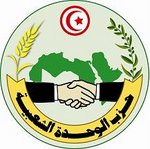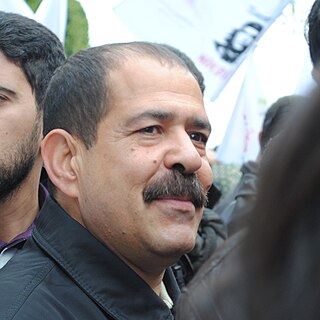Related Research Articles

Tunisia, officially the Republic of Tunisia, is the northernmost country in Africa. It is a part of the Maghreb region of North Africa, bordered by Algeria to the west and southwest, Libya to the southeast, and the Mediterranean Sea to the north and east. Tunisia also shares maritime borders with Italy through the islands of Sicily and Sardinia to the north and Malta to the east. It features the archaeological sites of Carthage dating back to the 9th century BC, as well as the Great Mosque of Kairouan. Known for its ancient architecture, souks, and blue coasts, it covers 163,610 km2 (63,170 sq mi), and has a population of 12.1 million. It contains the eastern end of the Atlas Mountains and the northern reaches of the Sahara desert; much of its remaining territory is arable land. Its 1,300 km (810 mi) of coastline includes the African conjunction of the western and eastern parts of the Mediterranean Basin. Tunisia is home to Africa's northernmost point, Cape Angela. Located on the northeastern coast, Tunis is the capital and largest city of the country, which is itself named after Tunis. The official language of Tunisia is Modern Standard Arabic. The vast majority of Tunisia's population is Arab and Muslim. Vernacular Tunisian Arabic is the most spoken, and French also serves as an administrative and educational language in some contexts, but it has no official status.

The Democratic Constitutional Rally or Democratic Constitutional Assembly, also referred to by its French initials RCD, formerly called Neo Destour then Socialist Destourian Party, was the ruling party in Tunisia from independence in 1956 until it was overthrown and dissolved in the Tunisian revolution in 2011.

The Popular Unity Party is an Arab nationalist party in Tunisia.

The Ettajdid Movement, also referred to simply as Ettajdid, was a centre-left secularist political party in Tunisia, active from 1993 to 2012.

The Socialist International (SI) is a political international or worldwide organisation of political parties which seek to establish democratic socialism, consisting mostly of social-democratic political parties and labour organisations.

The Democratic Forum for Labour and Liberties, also referred to as Ettakatol or by its French acronym FDTL, is a social democratic political party in Tunisia. It was founded on 9 April 1994 and officially recognized on 25 October 2002. Its founder and Secretary-General is the radiologist Mustapha Ben Jafar.

Tunisia competed at the 2000 Summer Paralympics in Sydney, Australia from August 29 to September 9, 2000.[1] This was the nation's fourth appearance at the Summer Paralympics since 1988. The Tunisian Paralympic Committee sent a total of 10 athletes to the Games, 8 men and 2 women to compete in Athletics only. Tunisia left Sydney with a total of 11 Paralympic medals.

Afek Tounes is a centre-right political party in Tunisia. Its program is liberal, focusing on secularism and civil liberties. The party mainly appealed to intellectuals and the upper class.

Hamadi Jebali is a Tunisian engineer, Muslim politician and journalist who was Prime Minister of Tunisia from December 2011 to March 2013. He was the Secretary-General of the Ennahda Movement, a moderate Islamic party in Tunisia, until he left his party in December 2014 in the course of the 2014 Tunisian presidential election.

Chokri Belaïd, also transliterated as Shokri Belaïd, was a Tunisian politician and lawyer who was an opposition leader with the left-secular Democratic Patriots' Movement. Belaïd was a vocal critic of the Ben Ali regime prior to the 2011 Tunisian revolution and of the then Islamist-led Tunisian government. On 6 February 2013, he was fatally shot outside his house in El Menzah, close to the Tunisian capital, Tunis. As a result of his assassination, Tunisian Prime Minister Hamadi Jebali announced his plan to dissolve the existing national government and to form a temporary "national unity" government.

The Popular Front for the Realization of the Objectives of the Revolution, abbreviated as the Popular Front (ej-Jabha), is a leftist political and electoral alliance in Tunisia, made up of nine political parties and numerous independents.
The Tunisia national beach soccer team, nicknamed Les Aigles de Carthage, represents Tunisia in international beach soccer competitions and is controlled by the Tunisian Football Federation, the governing body for football in Tunisia.

The People's Movement or Echaab Movement is a political party in Tunisia. It is a secularist, social democratic, Nasserist and Arab nationalist party founded in April 2011. The composition of the party has changed several times as a result of mergers and splits. Between 2013 and 2014, the People's Movement was a member of the Popular Front coalition, one of the three main coalitions of political parties in Tunisia. The former leader and founder of the party, Mohamed Brahmi, was assassinated on 25 July 2013 by unknown killers.

Yassine Brahim is a Tunisian engineer, manager and politician. Leader of the secular liberal Afek Tounes party, he was appointed Minister of Development, Investment and International Cooperation in February 2015.
The Green Tunisia Party, is a Green political party in Tunisia. Legalized only since the Tunisian Revolution in 2011, it participated in the Popular Front coalition until 2014.

Liberalism in Tunisia, or Tunisian Liberalism, is a school of political ideology that encompasses various political parties in the country.

Socialism in Tunisia or Tunisian socialism is a political philosophy that is shared by various political parties of the country. It has played a role in the country's history from the time of the Tunisian independence movement against France up through the Tunisian Revolution to the present day.
References
- ↑ "Organizations | Fourth International". Fourth International . Retrieved 28 May 2024.
- ↑ "[MLL] Tunisia : A new stage in left regroupment". www.mail-archive.com.
- ↑ "Ligue de la Gauche Ouvrière (Tunisie): Pour un pôle ouvrier populaire autour du syndicat UGTT". npa2009.org.